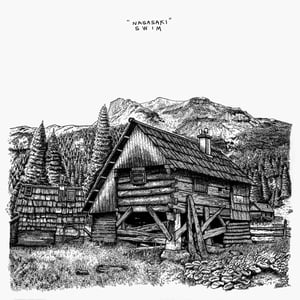$10.00
(NOTICE : ONE COPY REMAINING, MARKED DOWN DUE TO HAVE TRAVELED TO EUROPE TO USA TO EUROPE TO USA IN A SHIPPING SNAFU-R US)
Jasper Boogaard always juggled myriad projects. Too many, in fact, as he himself started to realize a year ago. It dawned on him that he needed a focal point of some kind. The question remains: how and where does one find such a thing when new opportunities and creative jolts keep arising, when new developments unfold in the world to be affronted by, and when said world suddenly stops in its tracks? An extended period away from home granted Boogaard a ton of new inspiration, which led to yet another endeavor to add to the pile: Nagasaki Swim. This one, however, managed to stick for the longer haul.
Jasper Boogaard has been living in Rotterdam for all his life. It’s a city he considers home – both in its concrete outlines and the vibrant music scene operating between its seams. In terms of his musical interests, Boogaard looked elsewhere for like-minded souls. “It may be an odd example, but I’m such a fan of the split single: one artist doing one side and another the other. It’s something I’ve sought out to do all my life, but there aren’t many artists in The Netherlands to do that with.” On the other side of the Atlantic there’s a surplus of bands and artists who operate on a similar wavelength as Boogaard: it was one of the reasons to earn his stripes as an audio engineer at Philadelphia’s Headroom Studios, the bulwark where the likes of Alex G, Algernon Cadwallader, Hop Along and Modern Baseball have recorded. In these months, Boogaard meets a ton of new people, discovering the ideal environment to seek new knowledge and find his own voice. When he returned to The Netherlands, things clicked into place. The accumulated experiences, skills and creativity set the stage for The Mirror, Boogaard’s first album as Nagasaki Swim.
“Initially I thought I was going to make a record about my time in Philly, and all the things that happened over there”, Boogaard explains. “When I came back, I felt fed up with The Netherlands. I figured: “I’m packing my bags and I’m going back again.” After a few months of reappraisal, he gradually started to grow back into his old home again. The music that manifested itself was driven by reflection – who was Jasper Boogaard over there, and who was he over here? That sense of displacement caused occasional rifts of frustration: why can’t a person live at two places at once? Why can’t he choose, period?
‘Solitude’ finds Boogaard strolling across downtown Philadelphia during a beautiful late summer afternoon: he enjoys the scenery, but at the same time, he contemplates the little things he can’t find over here. ‘The Bean’, inspired by a somewhat unfortunate visit to Chicago is followed by sounds of home: the ambience of Rotterdam, and the birdsong outside. ‘Big Swan’, concurrently, reconstructs a moment when he leaves his door for America, watching the waterfowl in the canals in his street. Feelings of homesickness and wanderlust invade a single headspace, causing Boogaard to “never feel quite present”.
Ultimately, The Mirror transcends the tale of two cities that anchors many of these songs. The life that resumed after Philadelphia – and ringed to a halt again during the pandemic – made as much an impression as anything on the album. During the first weeks of the lockdown, Boogaard spent the bulk of his time in his home studio looking for a way to channel everything in a focussed and exciting way. It resulted in many of Boogaard’s ongoing projects (Midwinter Bonfire, Goodnight Moonlight) drawing to a natural close. Nagasaki Swim, meanwhile, emerged.
As a result of his recent adventures, The Mirror didn’t exactly become a traditional record with a set group of musicians. Boogaard asked many friends individually to contribute to the tracks. One of those guests is violin player Molly Gerner, who performs regularly for Alex G among others; she takes center stage on ‘The Water’. One of Boogaard’s fellow alumni contributes lap steel flourishes to ‘Six Months’ and ‘Solitude’ further imbuing that homely alt-country spirit into the music. This newly cherished love for pastoral sounds forms a fresh injection to influences Boogaard drew from over a longer period, namely bands such as LVL UP, Woods and Mount Eerie. The connective tissue that makes Nagasaki Swim a living breathing vehicle was yet another new project: under the name J.T. Boogaard, he composes field recordings and soundscapes. According to Boogaard, wants to add “that sense of being present” – as he himself puts it –, whether that’s in Rotterdam or Philly, or a dreamscape that highlights the best of both these worlds. - Ruben van Dijk (translated to English by Jasper Willems)
